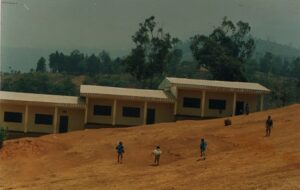The FORUMI Program
Description
Fourmi is the French word for ant. This acronym was developed to illustrate the aspects on which the approach is based: Funds for Urban Development and Micro Initiatives. IDF helped GRET implement this project in Bamenda, which was one of the five target towns selected. IDF acted as a local partner who coordinated and provided support and advice to local associations for the preparation and implementation of collective interest projects and of a fund to co-finance these works.
Project Context
FOURMI had three priorities:
(1) the promotion of public health;
(2) the improvement of living conditions; and
(3) the conservation of natural resources.
The general aim of FOURMI was to improve the urban environment in the disadvantaged neighbourhoods of the main towns of Cameroon through micro-projects that would, among other things, create infrastructure and employment for the local population. GRET, a French NGO, was selected by the EU and the Cameroon Government to execute the project. IDF was chosen by GRET to act as an intermediary structure to implement the project in the North West Region. IDF was to accompany the structuring and formalisation of development associations in various quarters. Local animators residing in various quarters were trained in order to reinforce the internal dynamic of the various associations by facilitating the participation of the inhabitants in the definition of priorities, the mobilisation of quarter’s financial or material contribution, and the follow up and maintenance. IDF’s technical service was to design the projects as requested by the population, prepare the file and defend the proposal to the selection committee in Yaoundé. Once the project was accepted, then IDF’s technical service was to prepare the bid and assist in the selection of a supplier. Then, IDF and the development committee had to follow up the construction, the management and maintenance of the infrastructure.
 Improved roads and bridges thanks to Forumi
Improved roads and bridges thanks to Forumi
Activities
In its role of local practitioner, IDF had two main objectives, first to ensure that the work undertaken was useful, of high quality and was an effective use of funds, and secondly that IDF contributed to the structuring of inhabitants in their quarters. Under those objectives, IDF carried out the following activities:
- Carried out extensive research of the quarters and their inhabitants in order to better understand their situations, needs and priorities;
- Established action plans for each quarter setting out the approach and plan of activities that would be carried out in each quarter;
- Raised awareness about the project within the quarters and encouraged participation;
- Assisted with the organization of elections for the DAs and built their capacities to effectively make decisions and manage the development in their quarters; and
- Supported the DAs to identify priorities, select projects, validate the selections, oversee the implementation, and monitor and evaluate the projects
 Schools built thanks to the FOURMI
Schools built thanks to the FOURMIIDF was successful in carrying out 31 micro-projects which considerably improved living conditions in disadvantaged neighbourhoods including the first 3 public fountains, 5 clean drinking water access points, 4 water supply expansions, 17 bridges, 6 classrooms for schools as well as drainage projects. IDF also supported 23 quarters and helped set up 31 DAs. This project helped lay the foundation for a decentralized development program by showing urban populations how the existence of a fund for financing micro-projects can be an effective way of alleviating poverty. The program demonstrated the feasibility of mobilizing human resources and showed local authorities that the population was ready to contribute to the provision of infrastructure if they had confidence in the way things are being done and if projects were properly managed.
Lessons Learned
- Collaboration between the State, NGOs and local businesses is possible in the area of development and can yield positive results.
- The expression of social needs must arise from participation at the grass roots and be supported by the population.
- NGOs can use international funds to promote local development
- The structuring of the population is a vital process that needs to occur to ensure decentralisation and sustainable local development.